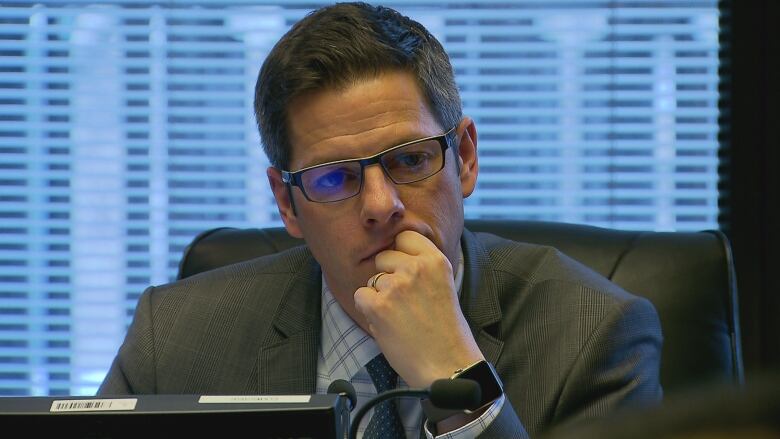Secrecy is openness. Opacity is transparency
How Winnipeg wound up 1 vote away from secret city council meetings

At the Ministry of Truth in George Orwell's 1984, three party slogans are emblazoned into the concrete facade.
"War is Peace. Freedom is Slavery. Ignorance is Strength," reads the exterior wall of the government-propaganda office in Orwell's cautionary tale, which has proven prophetic since its publication in1949.
Orwellian doublespeak has become a common facet of modernpolitical language. Politicians frequently don't say quite what they mean, usually to provide themselves wriggle room, and sometimes even make paradoxical statements.
Winnipeg Mayor Brian Bowman entered this unusual realmwhen he essentially argued that city hall needs more secrecyinorder to become more openand transparent.
On Wednesday morning, council's executive policy committee voted unanimously in favour of a plan that would allow council to meet, debate and votein camera that is, behind closed doors, away from media and public scrutiny for unspecified reasons.
Currently, city council is not allowed to approve legislation in secret. Council committees can vote in camera, but whatever they approve winds up at council, where all reports are made public.
The report approved by EPC would also grant council the right to meet in secret. Ostensibly, the change was proposed in order toconduct performance reviews of the city auditor in private.
But what EPC approved would also allow secret meetings for unspecified "other purposes." Chief administrative officer Doug McNeil said those votes potentially involvenegotiations with private corporations doing business with the city.
"Some companies prefer tobe more private, rather than public," McNeil said after the meeting.
Back in 2014, when the City of Winnipeg was still reeling from a series of construction and procurement scandals, Brian Bowmancampaignedfor mayor on a platform of openness and transparency. Since his election, he has frequently touted efforts to improve openness and transparency in Winnipeg.
A vigorous defence of secrecy
YetWednesday, the mayor not only voted in favour of allowing council to pass legislation at secret meetings, he vigorously defended that idea on the basis that some council committees already have that right and all members of council should have access to confidential information currently provided only to EPC members.
"I'm supportive of the motion because it improves accountability at city hall," said Bowman, stating "the overall thrust of the report" would provide Winnipeg with better accountability even though it would diminish openness and transparency at city hall.
Winnipeg should also have the right to meet in secret, because other cities do it, too, he argued.
"I don't believe thiswould be the only municipality in Canadathatwouldallow their members ofcouncilhave in camera meetings," Bowman said.
While these were remarkable statements, they were particularlyastonishing for Bowman, given the importance this mayor has placed on openness and transparency.
Asked whether he had actually read the report before he voted in favour ofit, the mayor insisted that he and every member of EPC readall the reports they vote on.
Asked whether he had ever read 1984, he declined to answer.
"Is there another question?" he asked.
EPC reconsidered the decision
Within hours, however, the mayor and other members of EPC reconsidered the enormity of their decision. A draft bylawwould allow future councils the ability todebate and pass legislation behind closed doors, for practically any reason, forever, and without anyone outside the inner sanctum learning what had transpired and who had voted in favour of it.
That is the very opposite of openness and transparency, as the mayor appeared to comprehend by the end of the day.
"My intent, and the intent of executive policy committee, was always to limit the authority of council to go in camera for the purposes of undertaking performance reviews of the city auditor," Bowman said in a statement.
"However, upon further review of the bylaw proposed by the public service and questions raised, I feel the in camera authority recommended by the public service is too broad."
Bowman then promised to amend the bylaw to restrict council's secret meetings "to matters relating to the performance review of the city auditor."
Bylaw amended
In an act of graciousness and contrition, the mayor took to Twitter to praise reporters in Winnipegfor questioning EPC's decision. Humility is a rare trait in a politician.
Nonetheless, one questionremains: what exactly was the public service trying to accomplish by crafting an "other purposes" bylaw that would have allowed secret council meetings for nearly any reason?
As well, it is not entirely clear EPC members read the reports they approve. If they did, Winnipeg wouldn't have been one vote away from chiselling "Secrecy is Openness, Opacity is Transparency" onto the facade of the council building.












_(720p).jpg)


 OFFICIAL HD MUSIC VIDEO.jpg)
.jpg)



























































































